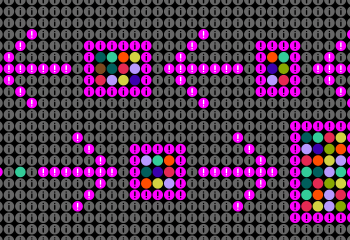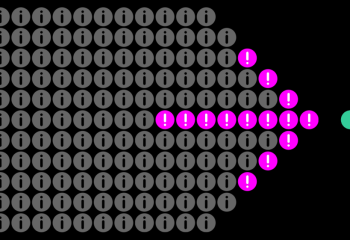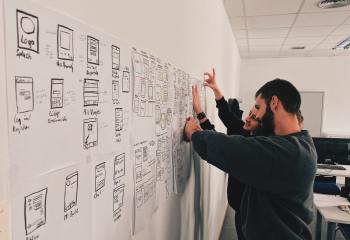Scholars and experts will work on projects to inform effective interventions that can mitigate the effects of intentionally misleading information targeting communities of color.
MIAMI — The John S. and James L. Knight Foundation announced today that nine universities and nonprofits were awarded more than $1.2 million to work on projects to identify solutions that help news organizations and civil society expose and lessen the impact of disinformation on communities of color. The grantees were winners of a Knight open call for proposals that advance independent scholarship, partnerships, tools and interventions to combat disinformation.
Knight believes democracy thrives when citizens are informed and engaged. The open call aimed to find a wide range and diverse set of experts to combat the ways that disinformation disproportionately impacts the accuracy of information that communities of color receive and impedes their engagement in democratic processes.
The winning proposals represented a diverse range of methods and approaches to this societal challenge and span a wide geographic area — from partnering with local churches and school districts, to addressing disinformation within Spanish-speaking populations in South Texas, to relying on community-based disinformation interventions in Syracuse’s predominantly Black South Side neighborhood. In two Knight cities, St. Paul and Miami, Florida, grantees will focus on scalable models for addressing disinformation within the Black community; and researching and reporting on disinformation operations targeting Latino voters in the upcoming 2022 election.
“Recent scholarship shows that communities of color are often targeted to discourage participation in our country’s civic and political life,” said John Sands, Knight’s senior director of Media and Democracy. “This challenge isn’t going away, but projects like these show promising paths forward. They leverage community relationships and expertise to test and better understand the mechanisms that build resilience to disinformation.”
This cohort joins the Knight Research Network, a sprawling network of scholars and policy experts in a growing field of study that seeks to understand and proactively inform responses to the role of digital media in our society. Since 2019, Knight has committed more than $55 million for independent research and policy insight that can improve the quality of information online and foster informed engagement in the democratic process.
“This funding opportunity has allowed me to explore solution making and bridge building in ways I wouldn’t have otherwise been able to consider,” said Danielle K. Brown, a project lead and recipient of a Knight grant at the University of Minnesota. “I am thrilled to have the opportunity to embark on this new branch of my research, building data that centers the perspectives and concerns of Black communities in the Minneapolis/St Paul area.”
Here’s more about the open call winners and their projects:
University of Minnesota
“Trusted Messengers Can Leverage Connections to Combat Disinformation about Black communities in Black Communities”
Led by Danielle K. Brown
To develop a scalable model for addressing dis/misinformation in Black communities
Texas Tech University
“Pulpit, Publics, and Practitioners: Combatting COVID-19 Mis- and Disinformation in Hispanic Communities Across the South Plains of Texas”
Led by Lucinda Holt, Ryan Litsey, Kent Wilkinson
To educate and support Spanish-speaking populations across the South Plains to identify and challenge mis- and disinformation by connecting them to trustworthy messaging
University of Texas-Austin and Rutgers University
“Addressing Disinformation Campaigns Against Diaspora Communities on Encrypted Messaging Applications”
Led by Samuel Woolley and Kiran Garimella
To study and report on how communities of color are being targeted with disinformation on encrypted messaging platforms, how they are responding, and what various stakeholders can do to support them; and to leverage these findings to build an end-to-end system for monitoring and fact-checking WhatsApp content from Asian American and Latinx diaspora communities
Florida International University/Miami Herald
“Miami Latinos misled: How political interests seek to sway the 2022 elections”
Led by Elena Maria Villar, Susan Jacobson (FIU); Casey Frank, Tabassum Zakaria (Miami Herald)
To investigate and document influence operations targeting Latino voters in the upcoming 2022 election and provide voters with information and tools that will help them determine the most accurate sources
Syracuse University – S.I. Newhouse School of Public Communications
“Co-Producing Disinformation Interventions on Syracuse’s South Side”
Led by Greg Munno, Shelvia Dancy, and Tina Nabatchi
To develop and test community-based disinformation interventions in Syracuse’s South Side
Johns Hopkins School of Public Health
“Building Vaccine Disinformation Resilience in Partnership with Latino Social Media Influencers”
Led by Alexandra Michel and Rupali Limaye
To build resilience among Latino communities against disinformation, especially vaccine disinformation
MediaJustice
“Resourcing communities of color to combat disinformation”
Led by Rumsha Sajid, Myaisha Hayes, and Steven Renderos
To develop and implement a train-the-trainer program to disrupt the spread of disinformation in communities of color
Santa Clara University
“Chinese language news discussion repository”
Led by Yuhong Liu, Yi Fang and Subbu Vincent
To build a repository of actors, posts, categories and behavioral patterns of disinformation operations targeting Chinese Americans around health and election issues
If you would like to interview John Sands, please contact Adam Peck at [email protected] or (202) 531-6408.
###
About the John S. and James L. Knight Foundation
We are social investors who support a more effective democracy by funding free expression and journalism, arts and culture in community, research in areas of media and democracy, and in the success of American cities and towns where the Knight brothers once published newspapers. Learn more at kf.org and follow @knightfdn on social media.
Knight announces new investments in tech and democracy research, including an open call for research into disinformation’s impact on communities of color



